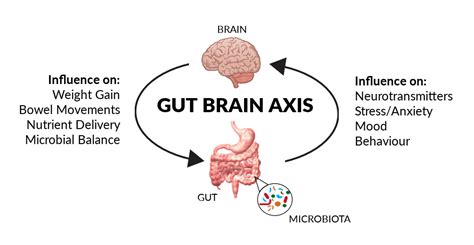RESEARCH HAS SHOWN THAT WHEN WE EAT RIGHT KIND OF DIET, IT HELPS TO BUILD HEALTHY MICROFLORA IN OUR GUT WHICH IN TURN RELEASES NEUROCHEMICALS TO AFFECT OUR MOOD POSITIVELY.
 Father of modern medicine Hippocrates postulated almost 2500 years back that all diseases begin in stomach. Modern day researchers have found exactly the same truth when they discovered that there is a fine line of communication between human brain and gut called gut-brain axis. We know that brain acts as the CPU of our body and there is a neural network that connects brain and digestive tract, but one of the most intriguing things that scientists have discovered is that only 10 percent of the communication happens from brain to gut whereas 90 percent of the communication is happening from gut to brain. You must have experienced how you feel in your mood on a day when your stomach is not up to the mark, when you have flatulence or feeling of indigestion or incomplete evacuation. Probably you have felt a little low on energy, irritable or not upbeat in your mood. Scientists in last two decades have found that our gut cells synthesize hundreds of neurotransmitters that affect our mood positively and one of them is serotonin also known as happiness hormone. But the key is that in order to synthesize these neurotransmitters our gut cells require right conditions which are provided by the right kind of bacterial species in our colon.
Father of modern medicine Hippocrates postulated almost 2500 years back that all diseases begin in stomach. Modern day researchers have found exactly the same truth when they discovered that there is a fine line of communication between human brain and gut called gut-brain axis. We know that brain acts as the CPU of our body and there is a neural network that connects brain and digestive tract, but one of the most intriguing things that scientists have discovered is that only 10 percent of the communication happens from brain to gut whereas 90 percent of the communication is happening from gut to brain. You must have experienced how you feel in your mood on a day when your stomach is not up to the mark, when you have flatulence or feeling of indigestion or incomplete evacuation. Probably you have felt a little low on energy, irritable or not upbeat in your mood. Scientists in last two decades have found that our gut cells synthesize hundreds of neurotransmitters that affect our mood positively and one of them is serotonin also known as happiness hormone. But the key is that in order to synthesize these neurotransmitters our gut cells require right conditions which are provided by the right kind of bacterial species in our colon.
Our Gut is a Battle Ground…
Our gut houses billions of bacteria of diverse species and collectively they constitute the microbiome of our gut. Most of these bacteria are harmless and make up the healthy flora of our colon. But some of these are harmful bacteria species too but if the good bacteria are in majority, they keep the harmful ones under check. As long as the good bacteria keep winning the battle for us, our gut stays healthy and in turn produces healthy neurotransmitters to bring up the health mood.
What Determines Which Side Wins?
Whatever we eat determines which side wins the battle. When we eat what the good bacteria feed on their colonies outgrow the harmful ones and vice-versa. So it is good to know what these bacteria feed on.
When Do We Feed the Good Bacterial Soldiers?
When we eat fresh raw plant food in form of fruits and veggies, whole grains, fermented food like curd and buttermilk we are feeding the good bacterial soldiers.
When Do We Feed the Enemy Bacteria?
 When we eat processed food with sugar, bakery/refined flour items like cookies, bread, cakes etc. then we are feeding the enemy bacteria in our guts.
When we eat processed food with sugar, bakery/refined flour items like cookies, bread, cakes etc. then we are feeding the enemy bacteria in our guts.
Incidentally the traditional Indian Yogic Lifestyle offers similar dietary recommendations for healthy mind and body. Following are some tips taken from the book How to Achieve Glowing Health and Vitality, which is a compilation of Paramhansa Yogananda’s wisdom on healthy lifestyle.
-
- Start your day with a half a lemon in lukewarm water at least twice in a week. It kills all the undesirable germs in our gut.
- Eat no more than two carbohydrate based cooked meals in day. Third meal can be in the form of fresh fruit or veggies bowl. This provides the necessary dose of fibre to our gut for regular cleaning.
- Give periodic break to your stomach in form of partial or complete fast at least once in a fortnight. Research has shown that periodic fasting is good for housekeeping of cells and gives protection against chronic diseases like autoimmune disorders and cancers.
- Avoid refined flour/bakery items and sugar in your diet. It is the main cause of constipation and bloating. Refined flour acts like a glue in our gut and does not get easily evacuated. As a result it gets fermented and releases toxins which when get absorbed into our blood stream lead to diseases like arthritis, allergies and autoimmune disorders.
Author of this article is a Physician, Researcher and Lifestyle Educator, Yoga and Meditation Teacher from Ananda Sangha, Faculty at SKN Medical College, Pune
















